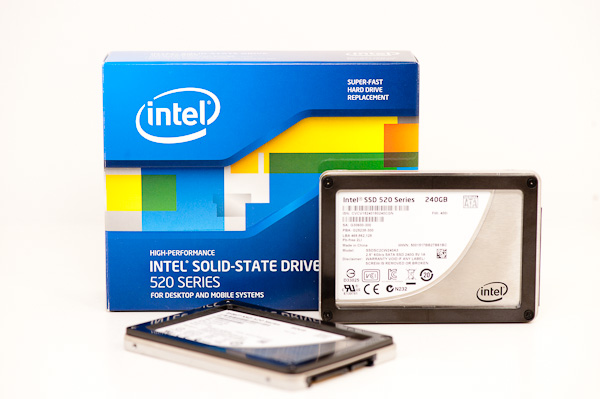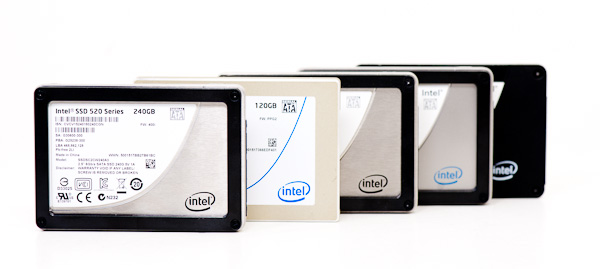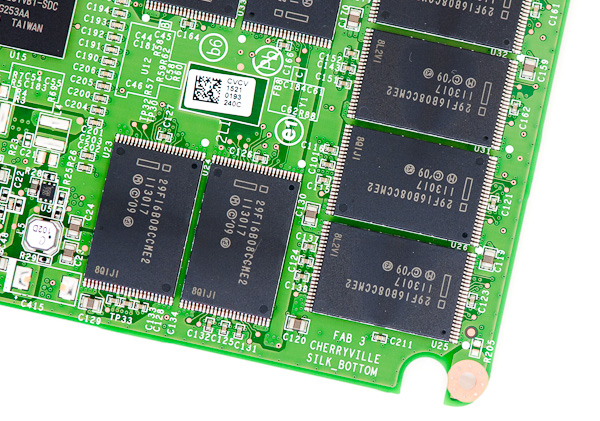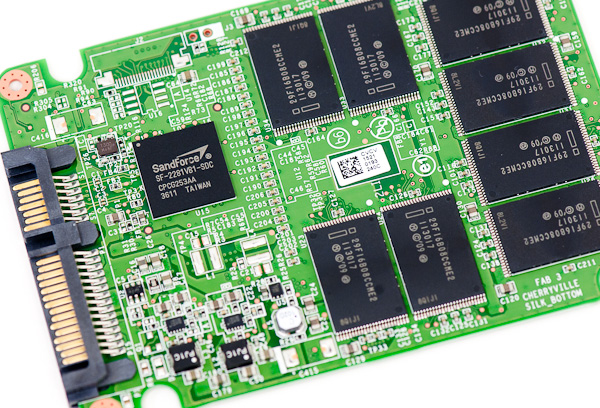Intel SSD 520 Review: Cherryville Brings Reliability to SandForce
by Anand Lal Shimpi on February 6, 2012 11:00 AM ESTIntel was rumored to be working on a SandForce based drive for several months now, but even the rumors couldn't encapsulate just how long Intel and SF has worked on this drive. According to Intel, the relationship began 1.5 years ago. Still lacking a 6Gbps controller of their own and wanting to remain competitive with the rest of the market, Intel approached SandForce about building a drive based on the (at the time) unreleased SF-2281 controller. Roughly six months later, initial testing and validation began on the drive. That's right, around the time that OCZ was previewing the first Vertex 3 Pro, Intel was just beginning its extensive validation process.
Codenamed Cherryville, Intel's SSD 520 would go through a full year of validation before Intel would sign off on the drive for release. In fact, it was some unresolved issues that cropped up during Intel's validation that pushed Cherryville back from the late 2011 release to today.
Intel's strenuous validation will eventually make SandForce's drives better for everyone, but for now the Cherryville firmware remains exclusive. Intel wouldn't go on record with details of its arrangement with SandForce, but from what I've managed to piece together the Intel Cherryville firmware is exclusive for a limited period of time. That exclusivity agreement likely expires sometime after the SF-2281 is replaced by a 3rd generation controller. There are some loopholes that allow SandForce to port bug fixes to general partner firmware but the specific terms aren't public information. The important takeaway is anything fixed in Intel's firmware isn't necessarily going to be fixed in other SF-2281 based drives in the near term. This is an important distinction because although Cherryville performs very similarly to other SF-2281 drives, it should be more reliable.
As Intel has been working on this firmware for quite a while, it's likely that the 520 uses an older branch of the SF-2281 firmware that has been updated over the past twelve months.
The BSOD is Back, but Not on Intel
Back in October SandForce announced that it had discovered a firmware issue that resulted in unexpected BSODs on SF-2281 drives on certain platforms. Why it took SandForce several months to discover the bug that its customers had been reporting for a while is a separate issue entirely. SandForce quickly pushed out the firmware to OCZ and other partners. Our own internal testing revealed that the updated firmware seemed to have cured the infamous BSOD.
Just as background, our SSD testing is rarely over once the review goes live. Any drive we recommend gets tossed into a primary use machine somewhere within the company. We keep track of drive behavior, including any bugs or performance issues over time. This long term testing process takes place over months. The results of these long term tests are folded into future reviews and recommendations.
The BSOD is caused by a bug in SandForce's power state logic that ultimately results in the drive disconnecting from the system while it's running. It turns out that Windows isn't a fan of you hot un-plugging the drive it's running on, which results in the BSOD. We had two systems that exhibited the BSOD, both of which were fixed by the update last October.

As luck would have it, our own Brian Klug happened to come across an unexpected crash with his 240GB non-Intel SF-2281 based SSD two weeks ago when he migrated it to another machine. The crash was an F4 BSOD, similar in nature to the infamous BSOD issue from last year. While two of the systems we reproduced the BSOD bug on were cured by last year's firmware update, Brian's system (an X58/Core i7 build) was BSODing regularly playing Battlefield 3. Games end up being a great way to trigger the SF-2281 BSOD issue as they frequently switch between periods of idle and load, which does a good job of stressing the power state logic in SandForce's firmware. I immediately sent Brian an Intel SSD 520 to see if the BSOD remained on Intel's drive. Switching to Cherryville caused Brian's BSODs to go away. Indeed most end user reports of SF-2281 BSODs went away with the fixed firmware, but we've still heard of isolated issues that remain unresolved. Whatever Intel has done with the 520's firmware seems to have fixed problems that still remain in the general SF-2281 firmware.
This is actually a dangerous precedent as it means one of two things. The first possibility is that SandForce has been made aware of flaws in its current firmware and chooses against (or is legally prevented from) disclosing it to its partners. The second possibility, and arguably even worse for SandForce, is that Intel was able to identify and fix a bug in the SF-2281 firmware without SandForce knowing it existed or was addressed. I suspect it's the former but as no one is willing to go on the record about the Intel/SandForce agreement I can't be certain.
Intel did go on record saying that the 520 is expected to have far fewer F4/F7 BSODs than any other SF-2281 drive. I asked Intel if I should read into the phrase "far fewer", but the answer was no - the 520 is expected to have similar reliability to the Intel SSD 510 and 320.
At the end of the day that's what Intel really brings to the table with the 520. As you'll soon see, performance isn't very different compared to other SF-2281 based drives. Intel's biggest advantage comes from the unique firmware that ships with the drive. Intel is also quick to point out that while other SF-2281 manufacturers can purchase the same Intel 25nm MLC NAND used on the 520, only Intel's drives get the absolute highest quality bins and only Intel knows how best to manage/interact with the NAND on a firmware level. While it's nearly impossible to prove most of this, the fact that we're still able to reproduce a BSOD on the latest publicly available SF-2281 firmware but not on the SF-2281 based Intel SSD 520 does say a lot about what you're paying for with this drive.
And you are paying a premium for the 520 compared to other SF-2281 based SSDs on the market today:
| Intel SSD 520 Price Comparison | |||||||
| 60GB | 120GB | 180GB | 240GB | 480GB | |||
| Intel SSD 520 (SF-2281) | $149 | $229 | $369 | $509 | $999 | ||
| Kingston HyperX (SF-2281) | N/A | $205 | N/A | $420 | N/A | ||
| OCZ Vertex 3 (SF-2281) | $95 | $190 | $240 | $375 | $850 | ||
| Samsung SSD 830 | $110 | $220 | N/A | $360 | $800 | ||
Last year Intel hinted at a move from the consumer market to enterprise server and client markets. The 520's higher price likely won't matter there, but for consumers the higher price is noticeable - particularly with good options from companies like Samsung now available on the market.














138 Comments
View All Comments
Beenthere - Wednesday, February 8, 2012 - link
Unfortunately Intel just like OCZ, Corsair and most all the rest of the SSD purveyors have adopted the Asus Biz model where you ship it today and hope you can fix it tomorrow when people find it's got lots of defects.It's totally unscrupulous to ship products with defects that have not been corrected due to a proper validation procedure not being implemented because the mfg. was more interested in rushing the product to market for quick profits or they are simply incompetent.
If you bought a new car and the brakes didn't function you'd have a Helleva lawsuit. If the car's trans only worked on Wednesdays and Fridays, you'll have a Helleva lawsuit. If the car maker only responded to the problems by replacing the defective product with another defective product - yup, you'd have a Helleva lawsuit.
This is how a lot of SSD companies are responding the defects in consumer grade SSDs.
NitroWare - Thursday, February 9, 2012 - link
I understand what your saying but ASUS is a company who do no skimp on overall validation of their products. This can be objectively proven by comparing their BIOS changelogs and QVL lists against a tier 2 manufacturer.Enthusiast products are touch and go especially when high speeds or aggressive compatibility is involved. You can not have it both ways wether its a SSD, Mobo, VGA or even a car
There are 'stable' products and there are 'aggressive' products (esp mobos and vga)
The stable products, Intel Desktop Boards, Supermicro server/workstation boards, DELL/HP Prebuilts and some basic generic motherboards are BORING to part of the target market who are being targeted by cheap and fast SSDs.
Do dell even validate many different SSD controller on their desktop and portables?
There are firms who have SSD in Mission Critical apps. Either Team Lotus or Red Bull F1 I forget who switched all their pitcrew laptops to SSD due to vibration from the F1 engines.
Can you imagine what would happen if an engineer experiencing a BSOD such a frantic scenario ?
The target market want the bleeding edge and many vendors are forced to comply by playing the numbers game or including technical features on their products which have no benefit (eg extra power sockets) except as a marketing bulletpoint targeted to enthusiasts and matching their competition.
Many would be surprised how many features on components such as motherboards or power supplies are stuck on simply due to customer (OEM) requests or technical marketing/competitive demands.
There are parts of the enthusiast community, especially extreme and sub zero overclockers who don't care about 'stability' or who do not understand what the true meaning of this is. Their definition is stability is how much LN2 they can pour by balancing one hand with another hand on their mouse in vain effort to get their overclock stable.
Manufs of cheaper devices have never really cared about support and many have a small handful of design engineers who are already overworked. This has not changed in twenty years of PC add on devices.
It is a shame that some 'brand names' currently have issues really, a damm shame.
vol7ron - Tuesday, February 7, 2012 - link
One of Intel's biggest advantages was the spread spectrum of their wear-leveling controller. I may have missed it, but I didn't see any mention of it in the article.It would be nice if they could have combined the SF-2281 with their own controller to give a fast, controller that was spread evenly across the NAND, to further increase its shelf-life. Maybe that would be too costly, or maybe it wasn't needed, but I'm interested to hear what they have to say.
vol7ron
Sufo - Wednesday, February 8, 2012 - link
So, will the 720 be based on SF-2000? How far away is that?I'm soon to be building an enterprise server... are these Intel drives (5xx or 7xx) really up to enterprise load? Unlike many people, being able to pick something like the 710/720 would be a huge cost _saving_ - it seems to me that approved drives such as the HP ones cost 10x more than even these Intel drives.
On a side note, since Apple's acquisition of Anobit, is it safe to say the Genesis 2 is on hold?
Beenthere - Wednesday, February 8, 2012 - link
The story title is really inappropriate considering there is no proof that the 520 is any more reliable than other SSDs. There are even reports already of BSOD on the 520 drives at Intel's customer support forums.Wolfpup - Wednesday, February 8, 2012 - link
No question, BUT I'd still pick my Intel 320 over the 520. I still trust Intel's controller more, and the 320 is the only drive I know of that has built in hardware encryption. Completely awesome! I'm sure there must be other drives that do too, but that alone would have me picking the 320, and then when you consider I trust it more anyway, and it's a bit cheaper...Wish the 600GB 320 wasn't over $1000 though :-D Oh well, my 300GB one is okay, and my Seagate Momentus XTs are great too.
Beenthere - Wednesday, February 8, 2012 - link
Already reports of 520 BSOD at Intel support... :(Galvin - Friday, February 10, 2012 - link
I could get a BSOD and report in intel forums too. All I have to do is disable AHCI drivers in windows and reboot. Get a BSOD. I think the issue is not the drive but the user not setting their bios up correctly or windows correctly or both.Galvin - Friday, February 10, 2012 - link
Just wanted to update if you read that post. He fixed the problem. It had nothing to do with the drive. People want to hate intel just cause they're intel.mbryans - Thursday, February 9, 2012 - link
Intel SSD 520 Series 480 GB: random 4 KB writes up to (only) 42,000 IOPS? While for 240 GB could reach 60,000 IOPS. The greater capacity should be faster.